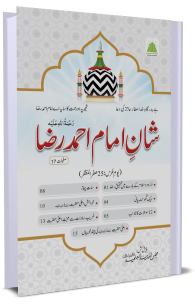The Eminence of Imam Ahmad Raza رَحْمَةُ الـلّٰـهِ عَلَيْه
The Eminence of Imam Ahmad Raza رَحْمَةُ الـلّٰـهِ عَلَيْه
Introduction
Imam Ahmad Raza Khan Barelvi (1856-1921) was a prominent Islamic scholar, theologian, and jurist from India, known for his profound contributions to Sunni Islam, particularly within the context of the Hanafi school of thought. He is widely regarded as the founder of the Barelvi movement, which emphasizes devotion to the Prophet Muhammad (peace be upon him) and adherence to traditional Sunni practices. His teachings and writings have left an indelible mark on Islamic thought and continue to inspire millions of Muslims worldwide.
Early Life and Education
Imam Ahmad Raza was born on June 14, 1856, in the town of Bareilly, in the present-day Indian state of Uttar Pradesh. His family belonged to the wealthy and respected Khān family, known for its Islamic scholarship. His father, Imam Naqi Ali Khan, was a renowned scholar who instilled a love for knowledge in his son from an early age.
At a young age, Ahmad Raza displayed remarkable intellect and a thirst for knowledge. He memorized the Quran at the age of seven and subsequently studied various Islamic sciences, including Arabic, Persian, Tafsir (Quranic exegesis), Hadith (traditions of the Prophet), Fiqh (Islamic jurisprudence), and Islamic theology. He received education from several distinguished scholars, which laid a strong foundation for his future as a leading Islamic authority.
Intellectual Contributions
1. Theological Works: Imam Ahmad Raza authored over 1,000 books, pamphlets, and articles on a wide range of topics, including theology, jurisprudence, and spirituality. His most famous works include Fatawa Razaviyya, a comprehensive compilation of legal rulings and scholarly opinions, and Hadaiq-i-Bakhshish, a collection of poetic praises for the Prophet Muhammad (peace be upon him).
2. Defense of Sunni Orthodoxy: Imam Ahmad Raza was a staunch defender of Sunni Islam against various theological challenges, particularly from the Ahmadiyya movement and other sects that deviated from traditional Sunni beliefs. His writings emphasized the importance of adhering to the teachings of the Quran and the Sunnah while rejecting innovations (Bid'ah) in religious practices.
3. Promotion of Love for the Prophet: One of the hallmark features of Imam Ahmad Raza's teachings is his profound love for the Prophet Muhammad (peace be upon him). He emphasized the significance of showing reverence and respect for the Prophet, promoting practices such as the celebration of Mawlid (the birth of the Prophet) as a means of expressing love and gratitude.
4. Establishment of Religious Institutions: Imam Ahmad Raza founded several religious institutions, including the Dar-ul-Ifta (Institute of Islamic Jurisprudence) and Ahl-e-Sunnat wal Jamaat, aimed at educating students and promoting Sunni beliefs. These institutions became centers for Islamic scholarship and learning.
Spiritual Influence
Imam Ahmad Raza's spiritual teachings emphasized the importance of sincerity (Ikhlas) in worship, the significance of seeking Allah's pleasure, and the necessity of adhering to the Sunnah of the Prophet. He believed in the concept of Tariqah (spiritual path) and guided his followers toward achieving closeness to Allah through devotion, prayer, and adherence to Islamic ethics.
His teachings also addressed contemporary issues faced by Muslims during his time, urging them to uphold their faith in the face of societal challenges. He inspired a sense of identity among Muslims in India, emphasizing the importance of unity and cooperation among Sunni Muslims.
Legacy and Impact
1. The Barelvi Movement: Imam Ahmad Raza is often considered the founder of the Barelvi movement, which emerged as a significant force within Sunni Islam in South Asia. The movement emphasizes love for the Prophet, adherence to traditional Sunni practices, and opposition to sectarianism. Today, millions of followers identify with the Barelvi tradition, which continues to thrive in various parts of India, Pakistan, and beyond.
2. Commemoration and Reverence: Imam Ahmad Raza's birth anniversary, known as Milad-e-Raza, is celebrated with great fervor among his followers. His mausoleum in Bareilly is a site of pilgrimage, attracting visitors who come to pay their respects and seek blessings.
3. Cultural Influence: His literary works, particularly poetry, have contributed significantly to Urdu literature. His poetic compositions reflect deep devotion and love for the Prophet Muhammad (peace be upon him), resonating with people across generations.
4. International Recognition: Imam Ahmad Raza's teachings and writings have gained recognition beyond South Asia. His emphasis on Sunni orthodoxy, love for the Prophet, and commitment to Islamic principles have resonated with Muslims worldwide.
Conclusion
Imam Ahmad Raza Khan Barelvi's life and contributions represent a remarkable chapter in Islamic history. His dedication to preserving Sunni orthodoxy, promoting love for the Prophet Muhammad (peace be upon him), and advocating for social justice has left an enduring legacy. His teachings continue to inspire countless Muslims, reminding them of the importance of faith, devotion, and adherence to the core principles of Islam. As a revered scholar and spiritual leader, his influence remains a source of guidance and inspiration for generations to come.
Tags
Book Of Al Furqan


.jpeg)